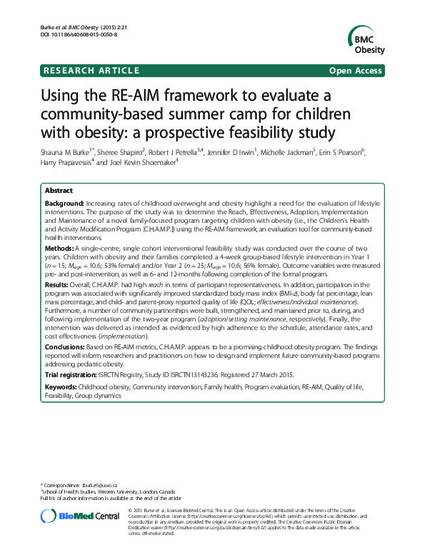
Background
Increasing rates of childhood overweight and obesity highlight a need for the evaluation of lifestyle interventions. The purpose of the study was to determine the Reach, Effectiveness, Adoption, Implementation and Maintenance of a novel family-focused program targeting children with obesity (i.e., the Children’s Health and Activity Modification Program [C.H.A.M.P.]) using the RE-AIM framework, an evaluation tool for community-based health interventions.
Methods
A single-centre, single cohort interventional feasibility study was conducted over the course of two years. Children with obesity and their families completed a 4-week group-based lifestyle intervention in Year 1 (n = 15; Mage = 10.6; 53% female) and/or Year 2 (n = 25; Mage = 10.6; 56% female). Outcome variables were measured pre- and post-intervention, as well as 6- and 12-months following completion of the formal program.
Results
Overall, C.H.A.M.P. had high reach in terms of participant representativeness. In addition, participation in the program was associated with significantly improved standardized body mass index (BMI-z), body fat percentage, lean mass percentage, and child- and parent-proxy reported quality of life (QOL; effectiveness/individual maintenance). Furthermore, a number of community partnerships were built, strengthened, and maintained prior to, during, and following implementation of the two-year program (adoption/setting maintenance, respectively). Finally, the intervention was delivered as intended as evidenced by high adherence to the schedule, attendance rates, and cost effectiveness (implementation).
Conclusions
Based on RE-AIM metrics, C.H.A.M.P. appears to be a promising childhood obesity program. The findings reported will inform researchers and practitioners on how to design and implement future community-based programs addressing pediatric obesity.
Available at: http://works.bepress.com/jenniferirwin/147/

e-Publication Number: 21
ISRCTN Registry, Study ID ISRCTN13143236. Registered 27 March 2015.
Western Libraries Open Access Fund recipient.